The Tackle: We miss so much about footy but what we miss most is connection to each other
There is so much we love about footy — watching the superstars, the goals, the tackles — and many of us also play the game, too. But what we miss most is each other and the connection footy gives us to one another, Mark Robinson writes.

AFL
Don't miss out on the headlines from AFL. Followed categories will be added to My News.
The most uncomplicated question — what do you miss about football? — prompts a million answers.
But, really, there’s only one answer.
We miss each other.
That’s what football does, and has done for a century or more. It brings people together.
Right now, we haven’t got football and we haven’t got togetherness.
We miss the banter with our mates, banter at work, at the pub and at the next door neighbour’s place for a BBQ.
We miss the sense of community which football delivers, not only for the hoards of AFL fans who converge on matches every weekend, but to every country, coastal and suburban footy club in the country.
Footy is layer upon layer of passion and purpose. It’s family and friends. It’s a day’s outing at the end of the week. It’s packing the car or catching the train and having that knot of adventure and anticipation when you first set eyes on the footy ground.
Relive classic AFL matches from the 60s to today on KAYO SPORTS. New to Kayo? Get your 14-day free trial & start streaming instantly >

We miss the action, of course. The game, the players and the goals. We also miss the totality of the occasion: The noise, the smells, the pies, the doughnuts. Of course, there’s the hurt of defeat and the joy of victory, the closer the result the better.
Patrick Dangerfield reckons footy is one big community.
On his worst days, as he endures discussions about hubs and job and salary cuts as the president of the players association, he feels like a political football sometimes.
On his best days, like he was on Saturday, football involves him.
“What do I miss? It’s the camaraderie,’’ he said. “The camaraderie from day to day, week to week. It’s about being around people. Everyone’s always got a story about something, creative mischief somewhere, and that’s all disappeared. You train with one person, you can’t see anyone else, and as much as teams have group WhatsApp, it’s not the same as being in each other’s presence or enjoying the ride together.
“That connection is gone.
“One of my good mates, I was talking to him about it the other day, footy for him is the closure of the week. You know, got to Friday afternoon and now I can be transported from whatever the week was at work into this adventure of footy, my club and my team, and the excitement of hopefully it goes well. If it doesn’t, well, it was ride to get there, And that’s gone, it doesn’t exist.’’
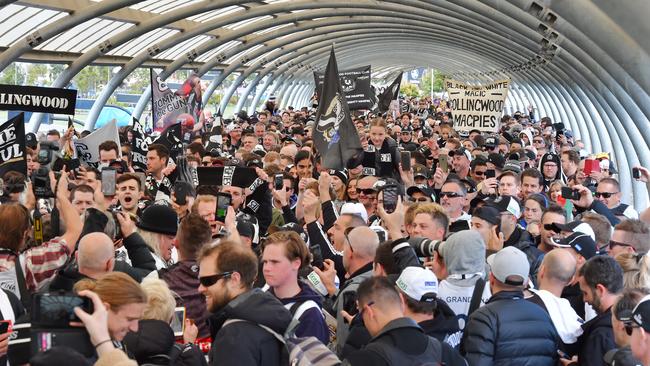
COMMUNITY FOOTBALL
Bruce ‘Keyhole’ Clark is a legend at the Inverloch Kongwak Football Netball Club
A town of 5400 people in winter — and 20,000 in summer — it’s a one-club, two-pub, one-pier seaside oasis in South Gippsland.
The footy and netball club, like it is for hundreds just like it, is the lifeblood of the community and with it dormant, the impact is spiritual as much as it is physical.
Thursday is teams night in the rooms. It gathers the town. Food is served. Beers are drunk. The world’s problems are solved.
“The football/netball club is a life line to our community which attracts families and friends of all ages, from 90-year-olds to families with babies and to children participating in junior levels to their mums and dads playing in their respective grades,’’ he said.
“For our members, footy is a weekly outing, starting on a Thursday night in the rooms, catching up over a beer and a meal. Game day is a huge part of the local community, which involves a large majority of the town discussing the good, bad and the ugly from game day.
“Importantly, it gives the locals a voice on where the town and club is heading.’’
History, he said, connects everyone. He says grandfathers played at Inverloch, their sons played there and now their sons and daughters carry the baton.
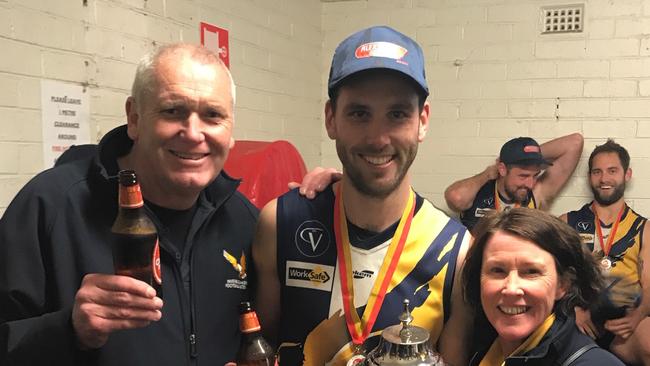
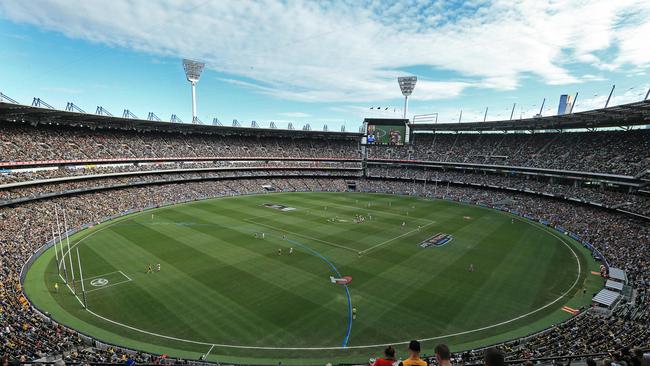
‘Keyhole’ has been at the club for 28 years and says the impact of the virus is impossibly deep.
“It’s been massive,’’ he said.
“Personally, it’s a great family day. We’ve been a committee person for over 20 years, I was a previous coach and player and to watch our two sons play together, with Rowan travelling from Melbourne, gives us valuable time as a family,’’ he said. “That’s important.
“You know, local footy is a lifeline of our community, not because of the games, but because it keeps everyone mentally and physically strong, and it keeps everyone together.’’
Anglesea was Dangerfield’s local junior team.
It still lives in him and he trained there on Saturday morning with teammate Josh Jenkins.
He is a superstar with a superstar earnings, but Dangerfield also understands, almost cherishes the simplicity of local footy.
“I remember Thursday night roast night at Anglesea,’’ he said “You have your main training session, the senior side gets picked and read out, everyone lines up for the roast, you’ve just been out on the track, it’s raining, it’s been bloody cold, everyone’s still dirty, half of them are lining up with their footy boots still on … there’s something about it. It’s awesome. It’s quintessential Australian. It’s just magic.’’
Mark O’Farrell is a legend at the Sandhurst Football Netball Club in Bendigo.
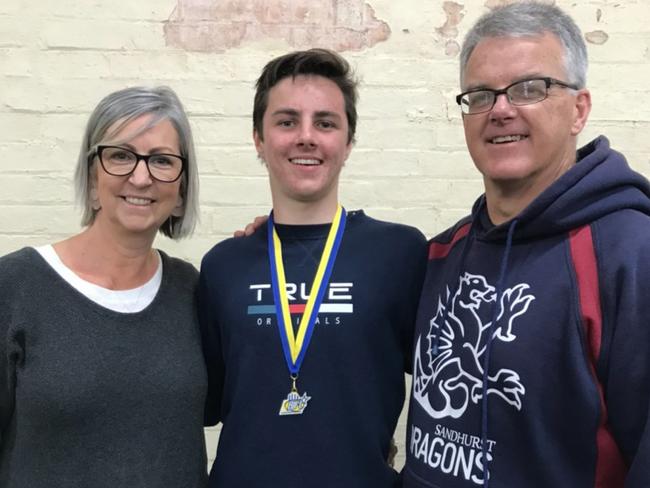
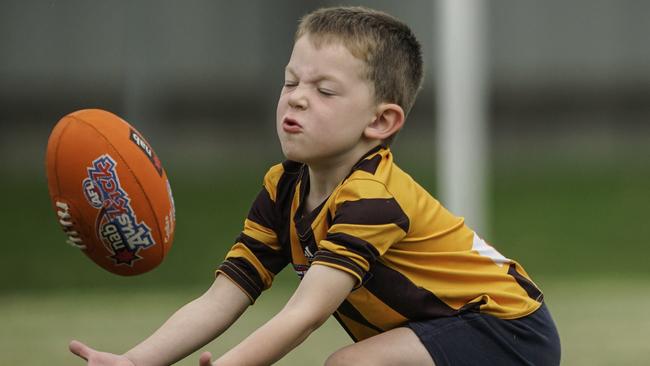
He played there from 1983 to 1999 and has been a committeeman practically since retirement.
His three boys now play at the Dragons which gives a clear indication of what football means to the O’Farrell family.
His day and others on the committee can often start at 8.30am at the Queen Elizabeth Oval, when the BBQ is set up, the signage is posted and the pads on the goalposts are applied. On great days, he might leave at midnight.
“Without football, my family and many of my close friends are suffering from not having the weekly joy of watching local footy,’’ he said.
“My boys are desperate to have footy start at some point this year and my family is just as keen to watch them play with their mates, many of whom are the children of my mates.
“I often despair at how I would have coped at the same age as the players of today without being able to see my mates and play footy every weekend.’’
O’Farrell is craving direction from the AFL.
An email from the AFL to community football clubs, dated April 24, revealed there will be an announcement after the May 11 lockdown deadline proposing a date for a resumption of training and return to play, including Auskick.
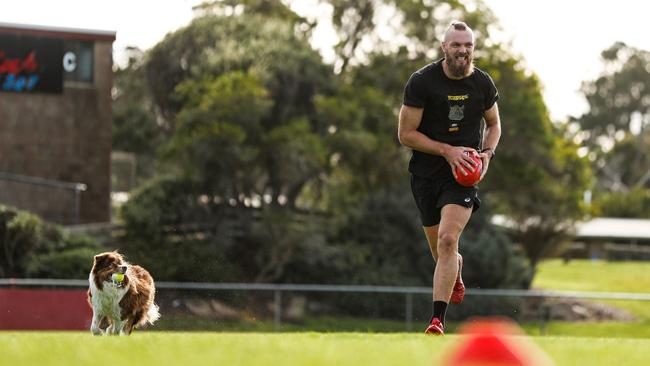
It was welcome news, O’Farrell said.
“Sometimes people forget what football means to family,’’ he said. “My boys are shattered. They trained all summer and football was suddenly swiped from them. And not just them, but thousands of players, from both football and netball. The impact has been huge, both physically and for the community, just that connection football brings.’’
Dangerfield is in the AFL bubble, but doesn’t live there. His wife Mardi, the mother of two children, and his sister Beth play for the Geelong Ammos, and those games and the connection are as important as AFL matches.
“She trains three days a week, she loves it, and all of sudden that’s gone, the connection to her group of teammates is gone,’’ Dangerfield said. “It’s the connection you get from pulling on the guernsey, trying to get better together, winning and losing together, picking each other up or patting each other on the back. All those emotions that sport is integral in generating and we’ve just lost it. It’s not there.’’
ESSENCE OF FOOTBALL
Missing playing football is a given for Dangerfield and all who play in the AFL, but playing football and missing football are two completely different discussions.
Dangerfield not once spoke about what transpires from the first bounce till the umpire raises both arms.
Instead, he spoke about missing the essence of football.
“I miss driving to the game,’’ he said. “I miss driving from Geelong … and there’s something about getting to the MCG. It’s afternoon, you’ve go to be there two hours before the game, it’s still sort of light and it’s changing dramatically as the sun sets and for some reason I always have in my head Paul Kelly and the MCG. There’s something magical about it. I miss that.’’
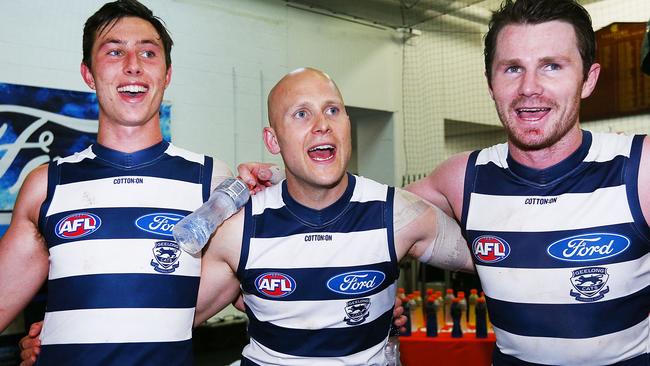
Kelly’s Leaps and Bounds is an anthem for everyone:
I’m high on the hill, looking over the bridge, to the MCG.
And way up on high, the clock on the silo, says eleven degrees
I remember, I remember.
I’m breathing today, the month of May, all the burning leaves
I’m not hearing a sound, my feet don’t even touch the ground.
I remember, I remember
Football, Dangerfield said, is totality over individual and, right now, those individuals have had their world’s up-ended.
“I miss that feeling of winning and being in the clubrooms afterwards and having that hour or so … everything we set out to do through the week and we executed it,’’ he said.
“That’s everyone at the club.
“Our administration rides the wins, losses and bumps as much as the players.
“And that’s the bloody tough part about where we are at at the moment. Those people who care so much for the footy club and through no fault of their own aren’t able to work there. You feel that as a player. You feel … and pressure is the wrong word … but you wan to get back to normal so everyone is back on the journey together.”
Football can’t be about simply playing the game.
“It’s far more,’’ he said. “When you’re part of a great club, it’s the 160 staff at Geelong coming together. More broadly, it’s the members you see during the week who come into the cafe at the club to wish you well or just to say hi. That’s all gone now. It hurts.’’
Most significantly he said football was about the fans, the very essence of the game.
“If Round 1 reinforced anything, and just think about it, the first ever game of Australian rules started with players, and beyond that the only reason we’re in the position we’re in now is because of the people who came and watched. They make the game,’’ he said.
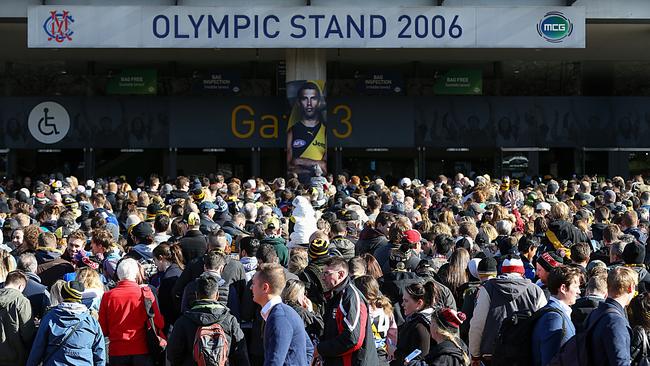
“You asked me what I miss, I miss those people who make the game, who are the game, who aren’t going to be there when we get back. That’s what we’ll miss as much as anything else. That feeling can’t be replicated in anything else we’ll ever do, that feeling of running out in front of, whether it be your home crowd or the away crowd, this incredible feeling of knowing they are there to watch us. It’s magical.’’
Those same people drive the conversation of the game, he said, which is the backbone of football’s connection.
Be it in the workplace or in the grandstand, banter is the next-level competition.
“We sit in the crowd together and that banter is half the fun,’’ Dangerfield said. “That banter is that Australian-ism. We love to take the p--- out of each other, better yet your best mate who barracks for whomever who were terrible at the weekend, and he just lives and breathes it, and he’s just cracked it. Everyone can relate to that. I can’t sit here and not smile when I talk about all the banter, it’s something that gets your heart beating.’’
Is banter what people miss the most about football?
It’s certainly true every football conversation has a hundred tangents attached and without football those conversations are dead, which in turn smothers our connection.
Dangerfield called it camaraderie and he’s correct — we miss each other.
“Football brings people together and it will bring people back together,’’ he said. ‘’I know that will happen.’’
MORE NEWS:
AFL greatest team of the decade: You decide the best team since 2010
Mick Malthouse urges AFL to play 2020 finals and Grand Final at a stadium where crowds are allowed
Jason Akermanis opens up about the biggest moments that saw him sacked from two AFL clubs
Originally published as The Tackle: We miss so much about footy but what we miss most is connection to each other


